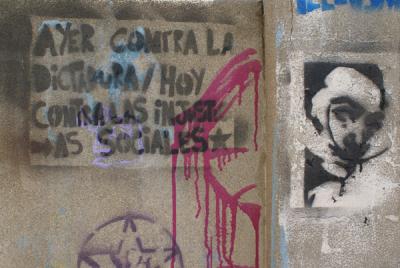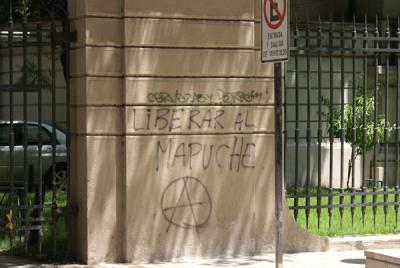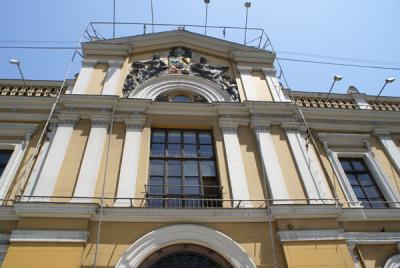Friday, 5. January 2007
Stories from South America. Universidad
If anything, Chile is first and foremost heard of when the media reports student protests. They have been doing that during the three-year rule of left-wing Salvador Allende, then they reappeared as resistance to rightist Pinochet´s dictatorship and now, with a pro-socialist divorced mother in power (in a state that is considered rather conservative otherwise), high school students voiced their demands to Michel Bachelet.

Protests in Chile began in late April and early May with a peak on May 30, when almost eight hundred thousand students went out to the streets in demand for abolishing the fees of college entrance exams, free public transportation and identity cards. However, over the days and nights spent in nearly half of secondary schools throughout the country that were occupied, “the penguins”, who were named after the black and white uniforms that los secundarios wear at school, changed their goals to a complete reform of educational policies in Chile. These efforts have been directed against LOCE (Ley Orgánica Constitucional de Educación) – the last stab of the dictatorship at reforming Chile’s social institutions in 1990. Today in some neigborhood of Valparaiso, definitely labeled ¨NOT FOR TOURISTS¨, I saw some grafitti which said something like ¨The dictator is dead, let´s get away with his constitution¨. Augusto Pinochet died on December 10, 2006, shattering hopes of victims of the regime’s abuses that he would be brought to justice. Seventeen years that he was ruling the country where “not a leave moved if he was not moving it” strongly affected the process of democratizing education and these effects are still felt today as the largest student mobilization since the fall of dictatorship has revealed. This LOCE law is a condensation of neoliberal economic policies applied to educational system. It officially allows anyone who has the money to manage primary and secondary schools; therefore, many prestigious schools are owned by big businesses or religious organizations such as Opus Dei or the Legions pf Christ (in fact, in Chile the democratization of education has always been associated with Protestantism as opposed to hierarchical Catholicism). What is more striking is that these wealthy owners of schools are paid government subsidies per student in attendance at their school and frauds are widespread.
The process of how student demands transformed into a broad upheaval against neoliberal economics is interesting in itself. University students gave lectures to los secundarios about politics that affect the quality of education in Chile in school halls filled with the sound of reggaetón. The protests united los secundarios with their fellows in private schools as well as with university students, the Mapuches, who also struggle for educational reforms, and even workers in the health sector as well as employees of department stores. Because students have been opposing the current system which can be equated with the state, they are often situated under the label of anarchism which ascribes them to a particular niche in the popular culture. Student protesters have to a large extent merged with anarchists, communists, even the indigenous, and, therefore, developed into a broad subcultural movement of the oppressed, where oppressed is anyone who has failed to be incorporated into the unifying national discourse. But the current allegations that the students are antipatriotic and revolutionary or anarchist has a long history. As long back as in mid-1920s university students allied with the anarchists in the demonstrations to complain of nationalism’s debility and to seek a pedagogical solution to Chile’s social conundrum.

Some insights into the rhetoric of the protests in 2006 would help. For example, a call for a general national strike in a leaflet distributed by the Internationalist Workers’ Party of Chile during the “walkout” of students on June 5 sums up the interrelatedness of student demands with broader social issues:
“For free state education at every level! Down with privately owned education! Free entrance to University! The educational budget must be funded through taxing the big fortunes, refusing to pay the external debt and cutting 80% off the military budget that pays the “gurka” Chilean Armed Forces, lackeys of her the murderous Bush and Blair!
Enough of hostages packing the Pinochetista jails of the civil-military regime! Freedom now for the imprisoned fighting students, for the political prisoners of the Mapuche movement, for all the political prisoners!
As the Chilean students say, “Enough of skyrocketing copper while education is laying on the ground!” The struggle should be for the complete re-nationalization of copper under workers’ control, so that this immense wealth funds free education, workers’ health services, and bread, jobs, living wages for all working people!
The struggle for free and state owned education is the struggle of all the workers and people in Chile!”
Student organizations, such as FECH (Federación Estudiantes Universidad de Chile), have been continuously engaged in the relations of allegiance to the parties. In opposition to the leftist response presented above, that with some modifications was articulated by a number of socialist movements and media sources throughout the world, there was also a right-wing voice that, although dissatisfied with the educational system in general, did not support abolition of fees and other egalitarian aspects of the proposed reforms.
The topic of the March of the Penguins was widely discussed in Chilean and international blogs. Manuel Guerrero Antequera, whose thoughts were reprinted in the opinion section of the Cultura Libre website, writes:
“Así como la lucha contra la dictadura fue llevada adelante por una multiplicidad de fuerzas, por una variedad de cuerpos en resistencia, por un enjambre de identidades en formación, acciones y subjetividades que se disputaban, en forma directa y abierta, el espacio de la política, los estudiantes secundarios de hoy han desbordado las formas de contenido y expresión dictados por quienes creen la única voz autorizada para señalar como ha de vivirse en democracia.”
Although now 95,8 percent of Chilean population over ten years old is literate and over the last decade the number of people with higher education has grown from 9 to 16 percent, education is still connected with structures of inequality. According to some sources, which could not be verified, a survey completed last year found that only 2.1 percent of high school students from municipal schools earned the minimum score required to enter a university on the country’s college entrance exam. The problems are much more complex than articulated by the student leaders in the protests. Students from lower tier schools don’t just lack the few dozens of dollars to pay for entrance exams. They lack the preparation which is necessary to stand a chance at entering a university. Only the smartest are admitted to public universities, like the Universidad de Chile, and only those who have sufficient income dare to attend private colleges, even though officially the loan system claims to be accessible to all. Therefore, even though the concrete minor demands of student protestors have been addressed through negotiations with the Ministry of Education, the strike persisted till autumn due to complexity of students’ demands that developed as the movement expanded to include more and more groups dissatisfied with the present state of affairs.

Now it seems over. The students were included in the group that drafted proposals to the government. However, just before officially handing them to the authorities the students quit, saying they disagree and still demand the overall rewriting of the Pinochet´s constitution. The university is also empty, summer hollidays in still hot and smoggy Santiago.

Protests in Chile began in late April and early May with a peak on May 30, when almost eight hundred thousand students went out to the streets in demand for abolishing the fees of college entrance exams, free public transportation and identity cards. However, over the days and nights spent in nearly half of secondary schools throughout the country that were occupied, “the penguins”, who were named after the black and white uniforms that los secundarios wear at school, changed their goals to a complete reform of educational policies in Chile. These efforts have been directed against LOCE (Ley Orgánica Constitucional de Educación) – the last stab of the dictatorship at reforming Chile’s social institutions in 1990. Today in some neigborhood of Valparaiso, definitely labeled ¨NOT FOR TOURISTS¨, I saw some grafitti which said something like ¨The dictator is dead, let´s get away with his constitution¨. Augusto Pinochet died on December 10, 2006, shattering hopes of victims of the regime’s abuses that he would be brought to justice. Seventeen years that he was ruling the country where “not a leave moved if he was not moving it” strongly affected the process of democratizing education and these effects are still felt today as the largest student mobilization since the fall of dictatorship has revealed. This LOCE law is a condensation of neoliberal economic policies applied to educational system. It officially allows anyone who has the money to manage primary and secondary schools; therefore, many prestigious schools are owned by big businesses or religious organizations such as Opus Dei or the Legions pf Christ (in fact, in Chile the democratization of education has always been associated with Protestantism as opposed to hierarchical Catholicism). What is more striking is that these wealthy owners of schools are paid government subsidies per student in attendance at their school and frauds are widespread.
The process of how student demands transformed into a broad upheaval against neoliberal economics is interesting in itself. University students gave lectures to los secundarios about politics that affect the quality of education in Chile in school halls filled with the sound of reggaetón. The protests united los secundarios with their fellows in private schools as well as with university students, the Mapuches, who also struggle for educational reforms, and even workers in the health sector as well as employees of department stores. Because students have been opposing the current system which can be equated with the state, they are often situated under the label of anarchism which ascribes them to a particular niche in the popular culture. Student protesters have to a large extent merged with anarchists, communists, even the indigenous, and, therefore, developed into a broad subcultural movement of the oppressed, where oppressed is anyone who has failed to be incorporated into the unifying national discourse. But the current allegations that the students are antipatriotic and revolutionary or anarchist has a long history. As long back as in mid-1920s university students allied with the anarchists in the demonstrations to complain of nationalism’s debility and to seek a pedagogical solution to Chile’s social conundrum.

Some insights into the rhetoric of the protests in 2006 would help. For example, a call for a general national strike in a leaflet distributed by the Internationalist Workers’ Party of Chile during the “walkout” of students on June 5 sums up the interrelatedness of student demands with broader social issues:
“For free state education at every level! Down with privately owned education! Free entrance to University! The educational budget must be funded through taxing the big fortunes, refusing to pay the external debt and cutting 80% off the military budget that pays the “gurka” Chilean Armed Forces, lackeys of her the murderous Bush and Blair!
Enough of hostages packing the Pinochetista jails of the civil-military regime! Freedom now for the imprisoned fighting students, for the political prisoners of the Mapuche movement, for all the political prisoners!
As the Chilean students say, “Enough of skyrocketing copper while education is laying on the ground!” The struggle should be for the complete re-nationalization of copper under workers’ control, so that this immense wealth funds free education, workers’ health services, and bread, jobs, living wages for all working people!
The struggle for free and state owned education is the struggle of all the workers and people in Chile!”
Student organizations, such as FECH (Federación Estudiantes Universidad de Chile), have been continuously engaged in the relations of allegiance to the parties. In opposition to the leftist response presented above, that with some modifications was articulated by a number of socialist movements and media sources throughout the world, there was also a right-wing voice that, although dissatisfied with the educational system in general, did not support abolition of fees and other egalitarian aspects of the proposed reforms.
The topic of the March of the Penguins was widely discussed in Chilean and international blogs. Manuel Guerrero Antequera, whose thoughts were reprinted in the opinion section of the Cultura Libre website, writes:
“Así como la lucha contra la dictadura fue llevada adelante por una multiplicidad de fuerzas, por una variedad de cuerpos en resistencia, por un enjambre de identidades en formación, acciones y subjetividades que se disputaban, en forma directa y abierta, el espacio de la política, los estudiantes secundarios de hoy han desbordado las formas de contenido y expresión dictados por quienes creen la única voz autorizada para señalar como ha de vivirse en democracia.”
Although now 95,8 percent of Chilean population over ten years old is literate and over the last decade the number of people with higher education has grown from 9 to 16 percent, education is still connected with structures of inequality. According to some sources, which could not be verified, a survey completed last year found that only 2.1 percent of high school students from municipal schools earned the minimum score required to enter a university on the country’s college entrance exam. The problems are much more complex than articulated by the student leaders in the protests. Students from lower tier schools don’t just lack the few dozens of dollars to pay for entrance exams. They lack the preparation which is necessary to stand a chance at entering a university. Only the smartest are admitted to public universities, like the Universidad de Chile, and only those who have sufficient income dare to attend private colleges, even though officially the loan system claims to be accessible to all. Therefore, even though the concrete minor demands of student protestors have been addressed through negotiations with the Ministry of Education, the strike persisted till autumn due to complexity of students’ demands that developed as the movement expanded to include more and more groups dissatisfied with the present state of affairs.

Now it seems over. The students were included in the group that drafted proposals to the government. However, just before officially handing them to the authorities the students quit, saying they disagree and still demand the overall rewriting of the Pinochet´s constitution. The university is also empty, summer hollidays in still hot and smoggy Santiago.
ieva jusionyte, 23:29h
... comment